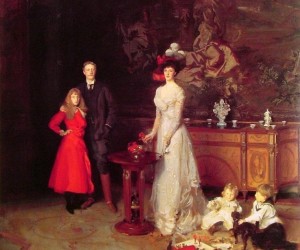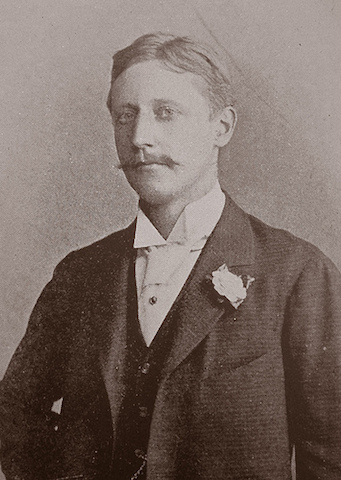“[Sir George Sitwell was] the strangest old bugger you ever met.” – Harold Acton.

The Sitwell Family, Edith (Left), Sir George (Middle), and Lady Edith (Right) [PHOTO: webartacademy.com]
Sir George Sitwell had a strange obsession with all things Italian, served briefly as an MP, restored his family seat called Renishaw Hall, and published a book about gardening. All these things may seem rather mundane, but, perhaps what was so fascinating about him was the degree to which he allowed himself to be consumed by his obsessions.
Early Life

PHOTO: webartacademy.com
Sir George Sitwell was born in 1860. When he was just four years old, his father died, and so little George inherited the family estates of Renishaw Hall, Derbyshire, and the Manor of Eckington. Even at such a young age, he was an eccentric little boy.
He was recorded as saying to a stranger on the train, “I am Sir George Sitwell, baronet. I am four years old and the youngest Baronet in England.”
Though he technically owned all of his family’s assets, debt left by his father had forced the little baron to abandon Renishaw Hall for the time being. So, he was raised in Scarborough with his mother, the Dowager Lady Louisa. As he grew up, he went to school at Eton and Christ Church, in Oxford.
![Lady Ida Sitwell [PHOTO: webartacademy.com]](https://historythings.com/wp-content/uploads/2016/09/Lady-Ida-Sitwell-web-art-academy-300x252.png)
Lady Ida Sitwell [PHOTO: webartacademy.com]
Sir George would go on to lose his parliamentary seat twice. After the second time, he gave up his interest in politics and turned his interests to more eccentric, obsessive pursuits.
Eccentric Inventions, A Fascination With the Past, and Hypochondria
![Renishaw Hall [PHOTO: dailymail.co.uk]](https://historythings.com/wp-content/uploads/2016/09/00C4FE57000004B0-3180451-image-a-7_1438294203257.jpg)
Renishaw Hall [PHOTO: dailymail.co.uk]
Sir George was obsessed with health, in fact, but his obsession was never grounded in reality. Whenever he traveled, he kept with him an immense case of medicines and carefully mislabeled each one so as to deter anyone who might want to use them for himself. His daughter, Edith, wrote in her memoir that he had her wear an iron back brace in order to correct her back and a nose truss to re-shape her profile.
To his credit, Sir George managed to move his family back into their ancient seat at Renishaw Hall and turned his rigorous attentions on bringing the building back to its former glory…but with an Italian twist.
During his travels, he had a particular interest in all things Italian. He spent long months abroad in full dinner dress, attending Italian rustic inns, and collecting unfashionable Italian baroque artwork and studying the Italian way of gardening, so much so that he wrote a whole book about it that had mild success.
When he was at home, he spent his time fashioning Renishaw Hall after the Italian image. He created award-winning Italian gardens and, instead of filling the house with fox heads and other hunting trophies like other English families, filled it with underappreciated Italian artwork that would later come to value a great deal of money.
While he and his family lived at Renishaw Hall, Sir George indulged in every single one of his eccentricities and whims. A sign at the front of the estate that was placed there to greet visitors read: “I must ask anyone entering the house never to contradict me in any way, as it interferes with the functioning of the gastric juices and prevents my sleeping at night.”
The most memorable part of Sir George Sitwell’s eccentricities was, perhaps, his peculiar inventions. As Edith wrote, “my father’s principal worry was that the world did not understand that it had been created in order to prove his theories”. He drew up the plans for lots of strange things, including a musical toothbrush and what he called the “Sitwell Egg’: a yolk of smoked meat surrounded by white rice (which impressed no-one). The sportsman could be amused, however, by his invention of a tiny pistol meant specifically to shoot down wasps.
Family Collapse
![The three Sitwell Siblings (From left), Sacheverell, Edith, and Osbert. [PHOTO: dailymail.co.uk]](https://historythings.com/wp-content/uploads/2016/09/2AFA436B00000578-3180451-image-a-1_1438292330936.jpg)
The three Sitwell Siblings (From left), Sacheverell, Edith, and Osbert. [PHOTO: dailymail.co.uk]
In 1915, Lady Ida Sitwell was taken to court over another monetary scandal and was sentenced to three months in Holloway for fraud. She was never the same. ‘In later years after she had fallen amongst thieves,” Edith wrote, “her appearance still retained the vestiges of that summer beauty, but as though a black veil had been thrown over it”.
Lady Ida died in 1937, and nobody missed her. Sir George’s valet said, “At least Sir George will know where Her Ladyship spends her afternoons”.
Death
Sir George Sitwell left his family after his wife’s death and retired to a reclusive life in Switzerland. He died there in 1943.
In Tales My Father Taught Me, his son, Osbert, wrote of him, “He was adept at taking hold of the wrong end of a thousand sticks, yet when by chance he seized the right end, his grasp of it was remarkable because of the intellectual power and application, as well as the learning, which he brought to his task”.

